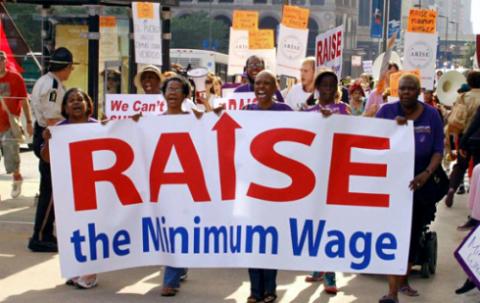The Fight for Free Education and Fair Minimum Wage in America
Jun 11,2015
Some argue that the cost of living does not equate to the amount of labor worked on a job, and that in order to obtain a higher salary one must have a degree of some sort.
What happens when you can’t afford to attend college? Or, have to drop out due to other financial obligations? These are two of the many questions that most Americans are still trying to find solutions to, but first, let’s discuss how much you would need to make an hour to live in the U.S.
According to the National Low-Income Housing Coalition, a worker would need to earn nearly three- times the current federal minimum wage of $7.25-$9 an hour to be able to afford a basic two-bedroom apartment, and that’s just on housing alone. When you factor in other necessities such as food, utilities, transportation, etc. the cost of living increases. Where you live in the U.S can also alter the living cost.
In terms of hours on the job, it's next to impossible to afford a one-bedroom rental on one minimum wage income without spending more than 30% on rent. For the majority of the country, workers need to clock between 61 and 79 hours a week to stay within that threshold.
Some cities such as Los Angeles expect to raise its minimum wage to $15 an hour from $9 over the next five years. Other cities, including New York and Washington, D.C., are still considering laws that would also set the local minimum wage at $15.
Walmart, the nation’s largest private employer has announced that they will raise the wages of approximately 500,000 of its employees to $10 by 2016.
Over the past several years Walmart employees have participated in protests and rallies in an effort to press the retailer to improve wages and working conditions.
Former Walmart employee Michael Neal expressed how he worked at the franchise for two years but also had to find work elsewhere in order to pay for shelter and school.
“I can’t say that I have experience harsh working conditions maybe like other employees can, but I can say that I couldn’t just work at Walmart and expect to live comfortably. Ten dollars an hour is still pretty low, but it’s progress,” said Neal.
The other alternative some say for a higher salary is to attend college.
“I made the decision to go off to college, because I wanted a career not just a job,” said Morgan Peterson.
Most college students and Americans believe that a college education is the key to a better life, but most importantly the gateway to financial freedom.
However, like any other institution it’s a cost to uphold, and some students are in debt because of it.
“A college degree is so important to getting a decent job these days. We must begin to see higher education as a right. Some Americans pursue a college diploma, others don't, but making sure that the option is available to everyone, even those whose parents are hard-pressed to pay for it, is necessary to preserving a free society,” said reporter Darryl Wellington
"It is totally unacceptable that Americans are drowning in $1.2 trillion in student loan debt," says Sen. Bernie Sanders. "It is unacceptable that millions of college graduates cannot afford to buy their first home or their first car because of the outrageously high interest rates they are paying on student debt."
Student debt is a major issue.
So if going to college could possibly land you in a pool of debt and with no job guarantee and the current minimum wage makes it hard to survive on that alone, Americans continue to fight for affordable education and an increase in wages.






